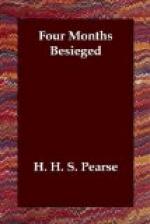[Illustration: THE BRITISH POSITION AT LADYSMITH, LOOKING SOUTH-EAST]
You may be sure that sick and wounded at Intombi hospital were not forgotten in the midst of our wild festivities. For them the morning train was laden with fruit, flowers, and such delicacies as the resources of this beleaguered town can still furnish. There are many unselfish people here who do not want to make money by selling things at market prices, or to keep for their own use the dainties that might be nectar to the lips of suffering soldiers. And there are officers also who have given of their abundance so freely that they will have to be dependent on similar generosity if the chances of war should number them among the sick or wounded. I must guard myself against being misunderstood. The hospital patients at Intombi Camp are not reduced to meagre fare yet, nor likely to be, but medical comforts are not all that a sick man craves for, and the simplest gifts sent from Ladysmith’s store that day must have been like a ray of sunshine brightening the lot of some poor fellow with the assurance that, though far from home, he was still among friends who cared for him. Nor were the weakly and the children who still remain in this town forgotten. Colonel Dartnell, a soldier of wide experience, who commands the Field Force of Natal Police, and is beloved by every man serving under him; Major Karri Davis, of the Imperial Light Horse; Colonel Frank Rhodes, Lord Ava, and a few others got together the materials for a great Christmas tree, to which all the little ones between babyhood and their teens were invited. The Light Horse Major’s long imprisonment with his brother officer Sampson in Pretoria, far from embittering him against humanity in general, has only made him more sympathetic with the trials and sufferings of others; just as heavy fines and a death sentence seemed to bring out the most lovable characteristics of Colonel Rhodes. It was Karri Davis who bought up all the unbroken toys that were to be found in Ladysmith shops; and the ready hands of ladies, who are always interested in such work, decorated the Christmas trees or adorned the hall in which this gathering was to be held with gay devices and hopeful mottoes. There were four trees. Round their bases respectively ran the words, “Great Britain,” “Australia,” “Canada,” and “South Africa,” and above them all the folds of the Union Jack were festooned. Contributors sent bon-bons and crackers in such profusion that each tree bore a bewildering variety of fruit. To avoid confusion in distributing prizes, these were numbered to correspond with the tickets issued; and Santa Claus, who patronised the ceremony, in a costume of snowy swansdown, that shed flakes wherever he walked, was content to play his part in dumb show, while the children walked round after him to receive the toys that were plucked for them, with many jests, by Colonel Dartnell and his genial colleagues. Over two hundred children were there, and many of them so young that it seemed as if the one precluded from attendance on the score of extreme youthfulness must have been the siege baby, who was then only a few days old. Generals Sir George White and Sir Archibald Hunter, with their aides-de-camp and many staff officers, came to take part in the interesting scene.




